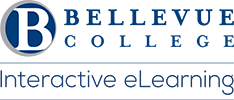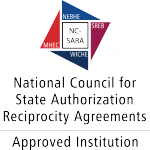State and Institutions Participating in SARA
Bellevue College is a member of SARA, a regional compact recently unified under a national “Unified State Authorization Reciprocity Agreement” (SARA). This nationwide initiative makes online courses more accessible to students across state lines and make it easier for states to regulate – and institutions to participate in – interstate eLearning education.
NC-SARA maintains a list of states and institutions nationally participating in SARA. The State Authorization Reciprocity Agreement is an agreement among member states, districts and territories that establishes comparable national standards for interstate offering of post-secondary distance education courses and programs.
For more information, please visit the SARA site describing Student Benefits or the individual State Actions Regarding SARA
Before offering classes via online/distance to students who reside outside Washington state, Bellevue College, like all other higher education institutions, must obtain authorization from those states in order to offer classes to their residents. At this time, due to extraordinarily high costs to obtain authorization, and/or other limiting factors –
- We regret that Bellevue College cannot offer distance education classes to students who live in Puerto Rico.
- Other states like CA, may have restrictions for certain online programs that require licensure and/or internships, externships, clinicals and practicums. Please contact the Program or Student Registration Office for more information.
Complaint Procedures
Complaint Resolution Procedures
Students residing outside of the State of Washington while attending Bellevue College through electronically delivered classes who would like to resolve a grievance should review the Student Dispute Resolution Procedure and contact the appropriate division office. However, if an issue cannot be resolved internally, you may file a complaint with the Washington Student Achievement Council.
The Washington Student Achievement Council (WSAC) has authority to investigate student complaints against specific schools. WSAC may not be able to investigate every student complaint. Visit Washington Student Achievement Council Complaints for information regarding the WSAC complaint process.
SARA institution.
State Authorization Reciprocity Agreements Policy and Operations Manual
Please check the individual state website for updated information.
Professional License
Students from outside the State of Washington, who are considering a program of study that may lead to professional license, should contact the appropriate licensing agency in their state of residence before beginning a course of study.
Clinical experiences and internships are also addressed in the SARA participation. SARA member institutions can accept students from other SARA member institutions. Under the Unified State Authorization Reciprocity Agreement (3.4.3), experiential learning opportunities include, such as a clinical, practicum, residency, or internship, provided that the institution has already obtained all the necessary professional and licensure approvals necessary (if any) to conduct the learning opportunity in the state, and only 10 students in the same academic program from each institution are physically present simultaneously at a single field placement site unless a higher number is approved by the host state’s portal agency.
For your convenience, please check on the licensing requirements for the state where you will seek employment. If you experience difficulty finding the license requirements for a specific state, please contact the program’s advisor for help.
What Students Need to Know About Professional Licensure
Public licensing disclosure
The Bellevue College Radiation Therapy Program curriculum meets the educational requirements for national certification that is required for employment in the United States. The American Registry of Radiologic Technologists is the agency responsible for individual certification.
The state of Washington requires additional licensure. The Bellevue College Radiation Therapy Program curriculum meets the educational requirements for state department of health licensure that is required for employment in the state of Washington. Washington State Department of Health is the agency responsible for individual licensure.
Bellevue College has not been able to determine if the radiation therapy program at Bellevue College meets the state education requirements in any other state, any U.S. Territory, or the District of Columbia. Please contact the state regulatory agency for radiation therapy in any other state for which this information is needed.
The Bellevue College Radiologic Technology Program curriculum meets the educational requirements for national certification that is required for employment in the United States. The American Registry of Radiologic Technologists is the agency responsible for individual certification.
The state of Washington requires additional licensure. The Bellevue College Radiologic Technology Program curriculum meets the educational requirements for state department of health licensure that is required for employment in the state of Washington. Washington State Department of Health is the agency responsible for individual licensure.
The Radiologic Technology program at Bellevue College does not meet the requirements for educational programs leading to licensure in some states because the program is not nationally accredited in radiologic technology.
Bellevue College has not been able to determine if the radiation therapy program at Bellevue College meets the state education requirements in any other state, any U.S. Territory, or the District of Columbia. Please contact the state regulatory agency for radiologic technology in any other state for which this information is needed. Review the State-by-state licensing requirements.
The Bellevue College Medical Dosimetry Program curriculum meets the educational requirements for national certification that is required for employment in the United States. The Medical Dosimetry Certification Board is the agency responsible for individual certification.
The state of Washington does not require any additional licensure. The Medical Dosimetry Program has not determined whether licensure is required in any other state. Direct disclosures are provided on an individual basis to students located outside the state of Washington. Documentation of direct disclosures are made available upon request to the Department of Education.
While there are no state licensing requirements for dosimetrist specifically, dosimetrists may be required to obtain a state license as a radiologic technician or nuclear medicine technologist.
The Bellevue College Nuclear Medicine Technology Program curriculum meets the educational requirements for national certification that is required for employment in the United States. Nuclear Medicine Technologists (NMTs) are certified by the Nuclear Medicine Technology Certification Board (NMTCB) and the American Registry of Radiologic Technologists (ARRT).
The Bellevue College Nuclear Medicine Technology Program curriculum meets the educational requirements for state department of health licensure that is required for employment in the state of Washington. Washington State Department of Health is the agency responsible for individual licensure.
Bellevue College has not determined if the nuclear medicine technology program at Bellevue College meets the state education requirements in any other state, any U.S. Territory, or the District of Columbia. Please contact the state regulatory agency for nuclear medicine technology in any other state for which this information is needed. Review the information available on the Society for Nuclear Medicine and Molecular Imaging webpage.
The Bellevue College Diagnostic Ultrasound Program curriculum meets the educational requirements for national certification. Students who complete Bellevue College’s Diagnostic Ultrasound Program will be prepared to take the national exam for their area of focus, administered by ARDMS.
WA does not require an additional license for ultrasound. Review the list of states that require an additional license are New Hampshire, New Mexico, North Dakota and Oregon.
The Bellevue College Medical Assistant curriculum is meets the requirements for licensure in the state of WA, as follows: Completion of a medical assistant program offered by a school accredited by a regional or national accrediting organization recognized by the US Department of Education, which includes a minimum of 720 clock hours of training in medical assisting skills, including an externship of no less than 160 hours.
In addition to completing the program, WA state requires additional licensure through the WA State Dept of Health.
Each applicant must successfully pass one of the following exams within five years prior to submission of an initial application for medical assistant certified:
- Certified Medical Assistant Exam through the American Association of Medical Assistants (AAMA); or
- Registered Medical Assistant Exam through American Medical Technologists (AMT); or
- Clinical Medical Assistant Exam through the National Health Career Association (NHA); or
- National Certified Medical Assistant Exam through the National Center for Competency Testing (NCCT).
Students who complete Bellevue College’s Neurodiagnostic Technology Program will be prepared to take the national exam for EEG, administered by ABRET.
Washington State does not require additional licensure to work as a Neurodiagnostic Technician or EEG tech.
Oregon does not require a license to work as an EEG or NDT technician. Oregon does require a license to work as a polysomnographer. Review the requirements for Oregon State.
The Bellevue College Associate Degree Nursing Program curriculum meets the educational requirements for the national certification that is required for employment in the United States. The National Council of State Boards of Nursing (NCSBN) administers the exam.
In accordance with U.S. Department of Education Regulation 34 CFR 668.43 (a) (5) (v), the associate degree nursing program at Bellevue College meets the state education requirements for a registered nursing license in the states of Washington. Washington State Department of Health is the agency responsible for individual licensure.
Oregon licensure requires, in addition, seven hours of pain management-related CE for licensure.
Bellevue College has not determined if the associate degree nursing program at Bellevue College meets the state education requirements in any other state, any U.S. Territory, or the District of Columbia. Please contact the state regulatory agency for nursing in any other state for which this information is needed.
The Bellevue College Nursing Assistant Technology program is state-approved and meets the educational requirements for state department of health licensure that is required for employment in the state of Washington.
Washington State Department of Health is the agency responsible for individual licensure.
Bellevue College has not determined if the Nursing Assistant Certified program at Bellevue College meets the state education requirements in any other state, any U.S. Territory, or the District of Columbia.
In Washington State, phlebotomists are required to have a license issued by the State Department of Health. For students to practice phlebotomy/gain employment as a phlebotomist in the state of Washington they need to do the following:
- Complete the Phlebotomy Program
- Fill out an application through the Washington State Department of Health
- Pay a fee
There is no exam required for the state license.
Students who complete the Bellevue College Phlebotomy Program can gain employment in most other states without obtaining an additional license, with the exception of California, Nevada, and Louisiana.
California: Students who complete the Bellevue College phlebotomy program are not eligible to obtain a phlebotomy state license from California because they require completion of a PHLE program that’s been accredited by CA.
Nevada: Students who complete the Bellevue College Phlebotomy program AND obtain national certification are eligible to apply for state licensure in Nevada as a phlebotomist.
Louisiana: Students who complete the Bellevue College Phlebotomy program AND obtain national certification are eligible to apply for state licensure in Louisiana as a phlebotomist.
National Certification
In addition to state licensure, students who complete the program are also eligible to apply for and take an exam to obtain national phlebotomy certification:
- National Phlebotomy Certification (American Society for Clinical Pathology [ASCP] Board of Certification
Coming Soon
Last Updated March 1, 2024

